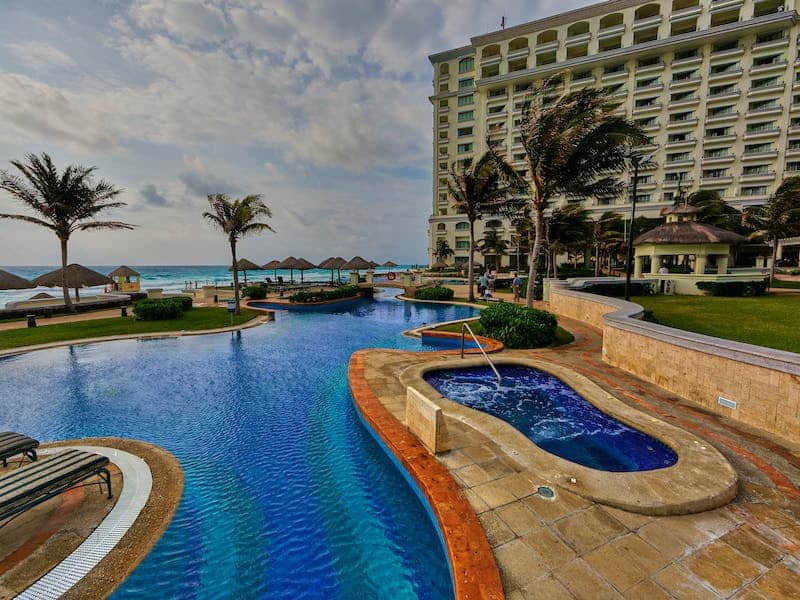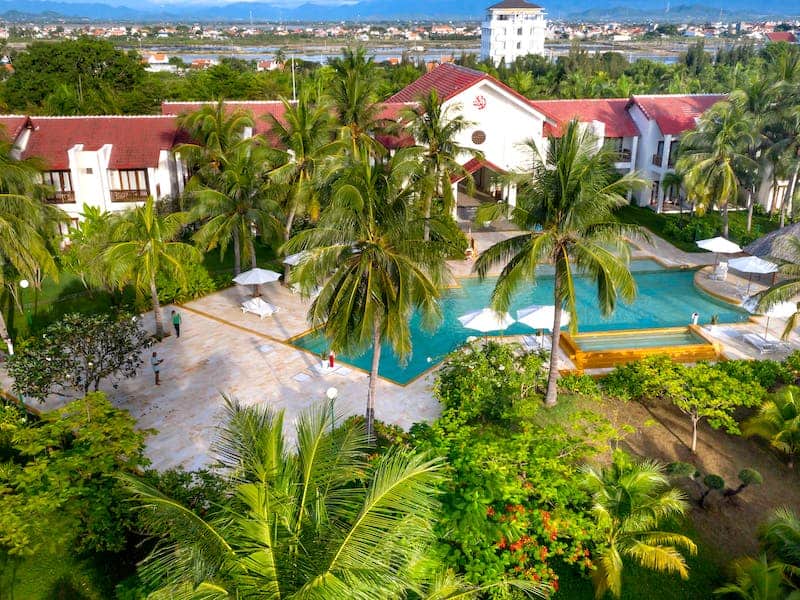Finding the right parcel of land is one of the most important steps when developing a new hotel project. The size and layout of the land will impact everything from the overall guest capacity to the types of amenities that can be offered.
If you’re short on time, here’s the key takeaway: The amount of land needed for a hotel can vary widely, but typical ranges are 1 to 3 acres for a small 50-100 room hotel, 5 to 10 acres for a 200-300 room full-service hotel, and 25+ acres for a large 500+ room resort.
If you’re exploring hotel development and want to understand approximate land requirements, read more on our comprehensive article here.
Factors That Determine Hotel Land Needs
When it comes to building a hotel, the amount of land needed can vary depending on several factors. These factors play a crucial role in determining the size and layout of the hotel, as well as the amenities and services it can offer.
Here are some key factors that influence the land requirements for a hotel:
1. Hotel Type and Size
One of the most significant factors that determine the land needs for a hotel is its type and size. Luxury hotels or resorts typically require more land compared to budget or boutique hotels.
Large-scale hotels with multiple restaurants, conference halls, and recreational facilities will naturally require more space. Similarly, the number of rooms and floors in a hotel also affects the land requirements.
2. Location and Surroundings
The location and surroundings of a hotel play a vital role in determining the land needs. Hotels in urban areas where land is limited may need to utilize vertical space by constructing taller buildings.
On the other hand, hotels in scenic or resort areas may require more land to accommodate sprawling gardens, pools, and outdoor recreational areas.

3. Parking Facilities
The availability of parking facilities is another important consideration when determining the land needs for a hotel.
Hotels that cater to guests with vehicles will require adequate parking space, which can significantly impact the overall land requirements. Some hotels may opt for underground or multi-level parking structures to optimize space.
4. Local Regulations and Zoning Laws
Local regulations and zoning laws can also influence the land requirements for a hotel.
Some areas may have specific requirements regarding setback distances, building heights, and open space ratios. Compliance with these regulations may affect the overall land area needed for the hotel’s construction.
5. Amenities and Facilities
The amenities and facilities offered by a hotel can also impact its land needs. Hotels with larger pools, spas, fitness centers, and extensive landscaping will naturally require more space.
Additionally, facilities such as restaurants, bars, and event spaces will also contribute to the overall land requirements.
6. Future Expansion Plans
Hotels that have plans for future expansion may need to allocate extra land for future construction. This strategic consideration allows for the hotel to grow and adapt to changing market demands without the need for significant land acquisition in the future.
Understanding these factors is crucial for hotel developers and investors to accurately estimate the land requirements for their projects. By considering these factors, they can ensure that the hotel is built on an appropriate land size that meets the needs of the target market and complies with local regulations.
Land Requirements by Hotel Type
When it comes to building a hotel, one of the key considerations is the amount of land needed. The land requirements can vary depending on the type of hotel being built. Let’s take a closer look at the land requirements for different hotel types:
Luxury Hotels
Luxury hotels are known for their spacious designs and extravagant amenities. These hotels typically require a significant amount of land to accommodate their large size and various facilities. With spacious rooms, multiple restaurants, swimming pools, spa centers, and other recreational areas, luxury hotels can occupy considerable land space.
On average, a luxury hotel may require anywhere from several acres to even several hectares of land.

Boutique Hotels
Boutique hotels, on the other hand, are more intimate and often characterized by their unique design, personalized service, and distinct ambiance. Due to their smaller size, boutique hotels generally require less land compared to luxury hotels.
However, the specific land requirements can vary depending on the number of rooms, facilities, and the overall design of the hotel. Typically, a boutique hotel may need anywhere from half an acre to a couple of acres of land.
Business Hotels
Business hotels are specifically designed to cater to the needs of business travelers. As such, their land requirements are often focused on convenient location and easy accessibility.
Business hotels are usually situated in city centers or near major transportation hubs, which means their land requirements may not be as extensive as luxury or boutique hotels.
However, the demand for amenities such as conference rooms, meeting spaces, and business centers should be taken into account when determining the land requirements for a business hotel.
Budget Hotels
Budget hotels are designed to provide affordable accommodation options for travelers on a budget. These hotels typically prioritize efficiency and cost-effectiveness, which often translates to smaller land requirements. Budget hotels are known for their compact room designs and limited facilities.
As a result, they generally require less land compared to luxury, boutique, or business hotels. A budget hotel may typically require less than an acre of land, depending on the number of rooms and facilities provided.
It’s important to note that the land requirements mentioned above are general estimates and can vary depending on various factors such as location, local regulations, and specific hotel design. Therefore, it is always advisable to consult with professionals in the hospitality industry or conduct thorough research before determining the exact land requirements for a hotel project.
Allowing Space for Expansion
When it comes to building a hotel, one of the key considerations is the amount of land that is needed.
It is important to allow for sufficient space not only for the hotel building itself but also for future expansion. This ensures that the hotel can grow and adapt to meet the needs of its guests over time.
Factors to Consider
There are several factors that determine the amount of land needed for a hotel. These include:
- The size and design of the hotel: The number of rooms, amenities, and facilities will determine the overall size of the hotel building. A larger hotel will naturally require more land.
- Parking and access: Hotels typically require parking areas for guests and staff. The size of the parking lot will depend on the number of rooms and the expected number of guests. Additionally, proper access to the hotel, such as driveways and entrances, must be taken into account.
- Outdoor areas: Many hotels have outdoor spaces such as gardens, swimming pools, or recreational areas. These spaces can enhance the guest experience and may require additional land.
Future Expansion
It is important to consider future expansion when determining the amount of land needed for a hotel. As the hotel business grows and evolves, there may be a need to add more rooms, amenities, or facilities. Having extra land available from the beginning can save time and money in the long run.
Expanding a hotel without sufficient land can be challenging and may require costly renovations or the acquisition of neighboring properties. By allowing space for expansion from the outset, hotel owners can avoid these potential issues and ensure smooth growth in the future.

Industry Standards and Case Studies
While the specific amount of land needed for a hotel will vary depending on factors such as location, hotel size, and design, there are industry standards and case studies that can provide guidance.
By industry standards, a full-service hotel with around 150 rooms may require approximately 4-5 acres of land. This includes space for the hotel building, parking, and outdoor areas. However, it is important to note that these figures are just a general guideline and can vary based on individual circumstances.
For example, a case study of a successful hotel development project in New York City found that the hotel was built on a plot of land measuring just 0.25 acres. This shows that the amount of land needed can vary significantly depending on factors such as location and design.
It is always recommended to consult with architects, engineers, and hotel development experts to determine the specific land requirements for a hotel project. This ensures that all factors are taken into account and that the hotel has the necessary space to thrive and grow in the long term.
For more information on hotel development and land requirements, visit Hotel Online.
Allocating Land for Amenities
When it comes to building a hotel, one of the most important factors to consider is the amount of land needed for the project. Allocating land for amenities is crucial in order to provide guests with a comfortable and enjoyable experience.
Let’s take a closer look at what factors are involved in determining how much land is needed for a hotel.
Factors to Consider
Several factors come into play when determining the amount of land required for a hotel. These factors include:
- The size of the hotel: The number of rooms and floors in the hotel will directly impact the amount of land needed. A larger hotel with more rooms will require more land.
- Amenities and facilities: Hotels often include amenities such as swimming pools, restaurants, spa facilities, and parking lots. The size and number of these amenities will also influence the land allocation.
- Location: The location of the hotel is a key consideration. Hotels in urban areas where land is limited may have to make the most out of a smaller plot, while hotels in rural areas may have more space to work with.
- Local regulations: Each jurisdiction may have specific regulations and zoning requirements when it comes to building hotels. These regulations can dictate the minimum land area needed for a hotel project.
Calculating Land Requirements
Calculating the exact amount of land needed for a hotel can be a complex process that requires careful planning and consideration. Architects and developers typically take into account the number of rooms, the size of each room, the desired amenities, and any potential future expansions.
It’s also important to consider the layout and design of the hotel. Efficient use of space can help maximize the number of rooms and amenities that can fit within a given land area.
Case Study: A 5-Star Luxury Hotel
For example, let’s consider a case study of a 5-star luxury hotel with 200 rooms. This hotel includes a swimming pool, a spa, a gym, a restaurant, and a conference center. Based on industry standards, each room requires approximately 400 square feet of space, while the amenities require an additional 20,000 square feet.
Using these measurements, the total land needed for this hotel would be approximately 120,000 square feet. However, it’s important to note that this is just a general estimate and can vary depending on various factors such as the layout and design of the hotel.
For more detailed information on land allocation for hotels, you can visit HospitalityNet, a leading website in the hospitality industry that provides valuable insights and resources for hotel developers and investors.
Local Zoning Regulations & Restrictions
When it comes to building a hotel, one of the most crucial factors to consider is the local zoning regulations and restrictions. These regulations are put in place by local governments to ensure that land is used in a way that is consistent with the needs and priorities of the community.
Understanding Zoning Regulations
Zoning regulations dictate how land can be used within a specific area. They define different zones such as residential, commercial, industrial, and recreational, each with its own set of rules and restrictions.
When it comes to building a hotel, developers need to ensure that the chosen location falls within a zone that allows for commercial or hospitality use.
Local zoning regulations may also include specific requirements for setbacks, height limitations, parking spaces, and other considerations. These regulations aim to ensure that the hotel fits into the surrounding environment and doesn’t negatively impact the community.
Restrictions on Land Use
Local governments may impose certain restrictions on the use of land for building hotels. These restrictions can vary widely depending on the location and the specific needs of the community. Some common restrictions include:
- Limitations on the height and size of the hotel building
- Requirements for a certain number of parking spaces
- Limitations on noise levels and operating hours
- Environmental considerations, such as protection of wetlands or other natural resources
It’s important for developers to thoroughly research and understand these restrictions before starting the process of building a hotel. Failure to comply with zoning regulations and restrictions can result in costly fines and delays.
If you’re interested in learning more about local zoning regulations and restrictions in your area, you can visit your local government’s website or contact the planning department. They will have the most up-to-date information and can provide guidance on the specific requirements for building a hotel.
Conclusion
The amount of land required to build a successful hotel depends on many considerations, from the planned number of guest rooms to the desired amenities.
While boutique hotels may need as little as an acre, sprawling resorts call for expansive properties covering 25 acres or more.
Careful planning is needed to allocate sufficient space for current and future needs. By factoring in key details like hotel type, room count, amenities, parking, and local zoning rules early in the site selection process, developers can identify an appropriately sized parcel of land for their unique hotel project goals.






